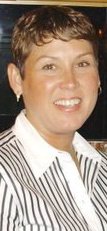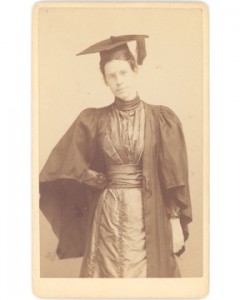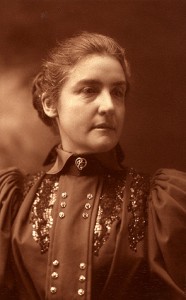My name is Lisa MacMurray and I am a student at Temple University studying Secondary Education – Social Studies. This semester our Social Studies Methods class wanted Temple students to help fellow history institutions in showcasing the importance of National History Day to both teachers and students throughout the Philadelphia and Pennsylvania region. Sam Perry (my classmate) and I interviewed with several institutions; however, we were thrilled to have been chosen to intern with Bryn Mawr College’s Greenfield Project and the study of women in education. This is an area of history in which both Sam and I are very much interested. Jennifer Redmond, CLIR Postdoctoral Fellow and Project Director, The Albert M. Greenfield Digital Center for the History of Women’s Education, has been our mentor throughout the semester and has helped guide us through the research process.
Part of our research has been to get a clear understanding of how hard it was for women to achieve higher education in a college that was not simply a “finishing school” but one that would demand more from them and help expand their knowledge and intellect. Additionally, Sam and I have been reviewing entrance examinations from the late 1800s through 1920 from several Seven Sister colleges, as well as, men’s Ivy League schools. We started by comparing and contrasting the examinations between Bryn Mawr, Radcliffe and Wellesley. Additionally, we have since looked at Yale, Harvard and University of Pennsylvania’s men’s colleges to compare their requirements to those of the women’s colleges. The findings are fascinating! The women colleges required just as much as the men’s colleges; yet, they were not allowed admittance to the men’s schools. Originally, we focused on large segments of the examinations; however, since we are Secondary Education – Social Studies majors, we decided that the primary focus should be on the History/Geography sections of the examinations. I have noticed that Bryn Mawr College has the hardest requirement with regard to History/Geography questions as compared to the other women’s colleges. Bryn Mawr’s History/Geography sections are compatible with Yale and Harvard. I could not compare University of Pennsylvania’s examination to Bryn Mawr as they had no examinations available for review, yet, we were able to gain much insight into the University of Pennsylvania’s discrimination against letting women into the university to earn a degree.
Now that our time at Bryn Mawr College is coming to a close, we will be making a lesson plan, along with test questions and, adding Bryn Mawr College’s entrance examination online so that teachers will be able to teach a lesson to their students to show how women did whatever they could to gain a higher education and, to have the students take the test so that they will see how difficult these examinations were. For one, Bryn Mawr required perspective students taking the examination to have enough knowledge to be able to translate Greek, Latin, French, and German, along with extensive knowledge in the English language. Students taking this examination online will most likely fail the test since they do not possess knowledge in all the language areas, let alone all the other content criteria that is included in the examination. I also feel that teachers can give their students (both males and females) better insight into the challenges that women had to overcome in order to earn a college degree and that no matter the inequality, they overcame and endured and many became influential women in society.
I have enjoyed my time at Bryn Mawr College and I am going to miss Jennifer and the program. I will begin Student Teaching in January so my time at Bryn Mawr will soon be finished; however, I have gained much knowledge during my internship and, if I have any available time, would love to help Jennifer with any other projects that the Canaday Library may be focusing on with regard to the Greenfield Digital Center.


